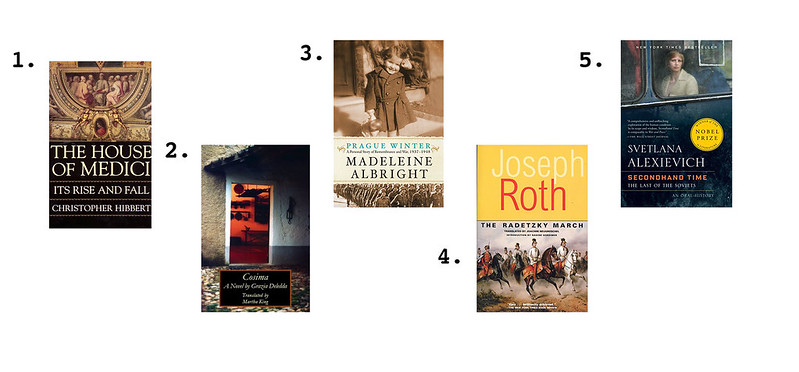
Since we planned a month long vacation before we left (and while we were "on the road") I figured it would be good to learn more about some of the places we were going.
FLORENCE
The House Of Medici: Its Rise and Fall - So much of Florence still references the Medici family (who ruled Florence for approximately 400 years, give or take) that reading a book about them gives context to the whole city - from the naming of buildings to the art in the museums. Knowing the stories made the city much more fun. (And, in retrospect, I wish I would have found books for the kids on the Medicis as well).
SARDINIA
Cosima - Other than D.H. Lawrence's The Sea and Sardinia, I had a hard time finding a good book involving the island (and I'm not a huge Lawrence fan).
Then I discovered Grazia Deledda (still totally confused why it took so long to find her, hello patriarchy). Deledda, who won the 1926 Nobel Prize in Literature (wow!!), wrote novels and stories about people on the island.
I chose to read Cosima, Deledda's semi-autobiographical novel of a little girl growing up in small town Sardinia. Cosima is both enraptured by her birthplace's beauty and frustrated by her town and family's embarrassment over her writing and creative life.
This was a really good book, I'd love to read more Deledda in the future.
PRAGUE
Prague Winter - Madeline Albrights' memoir/hisotry book tells the story of World War II through the perspective of Czechoslovakia. If you already know the history, this book may seem redundant, but I learned a lot and Albright continually asks the reader to question how they would have acted under similar circumstances.
VIENNA
The Radetzky March - As best summarized by Amazon, "The Radetzky March, Joseph Roth's classic saga of the privileged von Trotta family, encompasses the entire social fabric of the Austro-Hungarian Empire just before World War I. The author's greatest achievement, The Radetzky March is an unparalleled portrait of a civilization in decline, and as such, a universal story for our times."
At times, I found the story a little dull and the characters unbelievable. But the story itself is a good one, worth a read.
COMMUNISM
Secondhand Time, the Last of the Soviets - I must admit, I still haven't finished this book, as I find I can only read chunks at a time before I have to turn to something else. But that doesn't mean I don't love it. It's just too intense to read for long periods of time.
Svetlana Alexievich, who won the 2015 Nobel Prize for Literature, compiles her "fiction" by interviewing common people, then condensing and editing their stories. Her works are referred to as histories of emotions.
The stories are fascinating. And sad. If you want to know what life was really like under the Soviet Union, then this book is a must-read.
Just one of many great quotes, "I asked everyone I met what 'freedom' meant. Fathers and children have very different answers. Those who were born in the USSR and those born after its collapse do not share a common experience - it's like they're from different planets. For the fathers, freedom is the absence of fear . . . A man with his choice of a hundred kinds of salami is freer than one who only has ten to choose from. Freedom is never being flogged, although no generation of Russians has yet avoided a flogging. Russians don't understand freedom, they need the Cossack and the whip. For the children: Freedom is love, inner freedom is an absolute value. Freedom is when you're not afraid of your own desires; having lots of money so that you'll have everything; it's when you can live without having to think about freedom. Freedom is normal."
No comments:
Post a Comment